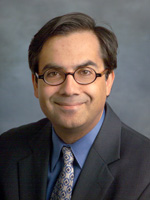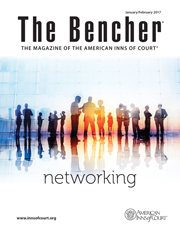DC Bar Ethics Opinions Relating to Social Media and Networking
The Bencher—January/February 2017
By John P. Ratnaswamy, Esquire

 In November 2016, the District of Columbia Bar Legal Ethics Committee issued two formal opinions relating to social media and networking, applying the DC Rules of Professional Conduct. Ethics Opinion 370 is entitled “Social Media I: Marketing and Personal Use.” Ethics Opinion 371 is entitled “Social Media II: Use of Social Media in Providing Legal Services.”
In November 2016, the District of Columbia Bar Legal Ethics Committee issued two formal opinions relating to social media and networking, applying the DC Rules of Professional Conduct. Ethics Opinion 370 is entitled “Social Media I: Marketing and Personal Use.” Ethics Opinion 371 is entitled “Social Media II: Use of Social Media in Providing Legal Services.”
Opinion 370 states: “Social media sites, postings, or activities that mention, promote or highlight a lawyer or a law firm are subject to and must comply with the rules. Attorneys who choose to use social media must adhere to the rules in the same way that they would if using more traditional forms of communication.” (Footnote omitted)
Opinion 370 notes six categories of social media and networking activities, including communicating with current and former clients and other lawyers; writing about your own cases; responding to reviews and comments; self-descriptions; reviewing third party endorsements; and making endorsements. The opinion states that, generally, each of those activities is permissible, but they must be conducted with caution. The opinion also cautions that, in some instances, the ethics rules of more than one jurisdiction may apply.
Among the risks identified by Opinion 370 are: inadvertent formation of an attorney-client relationship; creating conflicts of interest; breach of client confidences; failure to obtain informed client consent to writing about a case; violating the advertising rules; making false statements. The opinion also states that lawyers who choose to maintain a social media presence must take affirmative steps to remain competent regarding the technology being used, and that best practices and ethics rules will continue to evolve to keep pace with new technology.
Ethics Opinion 371 focuses on actual use of social media in the provision of legal services.
Opinion 371 begins by addressing use of social media to communicate with clients. The concerns noted relate to confidentiality and competence, and client consent to use of the form of communication.
Opinion 371 then addresses use of social media as a source of information in relation to cases and other matters. The opinion first discusses the client’s own use of social media, including concerns regarding accuracy and consistency, review by adversaries, and document preservation.
Opinion 371 then discusses social media of opposing parties, counsel, and experts. The opinion suggests that in some matters, investigating social adversaries of adversaries may be required, but it also cautions about creating a digital footprint as well as ethics compliance in relation to communicating with represented and unrepresented persons, pretexting, document preservation, inadvertent disclosures, and competence in relation to admissibility of evidence and service of process. The opinion next discusses social media of fact witnesses and other sources of facts and applies the same principles as those involving adversaries.
Opinion 371 moves on social media of jurors, judges, arbitrators, and regulators. The opinion notes concerns about ethics compliance and also, as to jurors, compliance with court orders.
Opinion 371 then discusses lawyer and law firm social media presence. The opinion incorporates Opinion 370 as to marketing and other purposes. The opinion also discusses concerns about confidentiality not only under the rules but also under confidentiality agreements and protective orders. The opinion also expresses concern about the rules relating to public statements about cases; influencing judges, jurors, prospective jurors, and other officials; and disrupting tribunals.
Opinion 371 also cautions that a lawyer or firm should be mindful of the conduct of subordinate lawyers and staff. The opinion, like Opinion 370, also notes that as technology evolves, the application of the rules will change as well.
The two DC Bar opinions are based on DC rules, as noted above, but they give a good sense of issues that might arise in any jurisdiction. They also remind us that the rules of more than one jurisdiction might apply.
John P. Ratnaswamy, Esquire, is a partner in the Chicago law firm of Rooney Rippie & Ratnaswamy LLP. He also serves as an Adjunct Professor of Legal Ethics at the Northwestern University School of Law. He is a former member of the American Bar Association’s Standing Committee on Ethics and Professional Responsibility and the Hearing Board of the Illinois Attorney Registration & Disciplinary Commission. This column should not be understood to represent the views of any of those entities or John’s or the firm’s current or former clients.
© 2017 JOHN P. RATNASWAMY, ESQ. This article was originally published in the January/February 2017 issue of The Bencher, a bi-monthly publication of the American Inns of Court. This article, in full or in part, may not be copied, reprinted, distributed, or stored electronically in any form without the express written consent of the American Inns of Court.